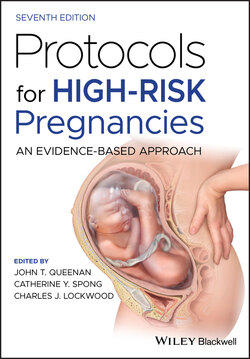Читать книгу Protocols for High-Risk Pregnancies - Группа авторов - Страница 151
Management Antenatal
ОглавлениеUnlike red blood cell antigen alloimmunization, FNAIT can severely affect a first pregnancy. Each successive pregnancy is at risk for fetal thrombocytopenia that tends to be more severe and occur earlier in gestation. A history of fetal ICH is the strongest predictor of an early onset in a future pregnancy. Given that disease worsens with successive pregnancies and that FNAIT‐associated ICH usually occurs prior to labor, antenatal therapy is strongly recommended in all pregnancies complicated by FNAIT in an effort to reduce risk for severe thrombocytopenia and related ICH.
Maternal intravenous human immunoglobulin (IVIG) is the most successful single treatment for the management of FNAIT. While its mechanism is unclear, it is believed to interfere with maternal antibody production and/or transplacental antibody passage. As a standalone intervention, IVIG has been shown to reduce ICH risk when compared to unexposed cases. Maternal side effects include headache, fatigue, flushing, myalgia, nausea, fever and chills, and hypotension. Premedication with acetaminophen and diphenhydramine reduces these ill effects, and in infrequent cases with persistent symptomatology premedication with methylprednisolone may also help. Rarely, IVIG treatment has been associated with aseptic meningitis, acute kidney injury, thrombosis, hemolytic anemia, and stroke. While anaphylactic reactions are believed to be rare, we recommend conducting the initial infusion in a monitored hospital or office setting. Typical dosing is 1 g/kg, administered once or twice weekly depending upon disease severity (see below), with each infusion lasting about 4–5 hours.
While ineffective as a standalone medication, corticosteroids are effective as an adjunct to IVIG for the antenatal treatment of FNAIT. Oral prednisone is recommended in our practice, with doses of 0.5–1 mg/kg daily (see below). Side effects include emotional lability, insomnia, hyperglycemia and gestational diabetes mellitus, acne, hypertension, fluid retention, immunosuppression, and potentially osteoporosis. In addition to glucose challenge test (GCT) screening at a usual gestational age, early GCT screening is recommended for patients exposed to corticosteroids beginning early in gestation. Calcium and vitamin D supplementation is advisable, as well.
Following decades of clinical trials of various approaches for the antenatal treatment of FNAIT, a risk‐based noninvasive approach has been developed that we recommend as a management algorithm. This strategy stratifies patients using clinical history, tailoring treatment regimen intensity based upon past disease severity. Patients are grouped according to whether a prior FNAIT pregnancy was complicated by ICH, and if so, how early in gestation it occurred. While this approach cannot eliminate all risk for severe thrombocytopenia and poor outcomes remain possible, it has proven remarkably successful in a large majority of FNAIT cases.
The risk‐based strata include the following.
